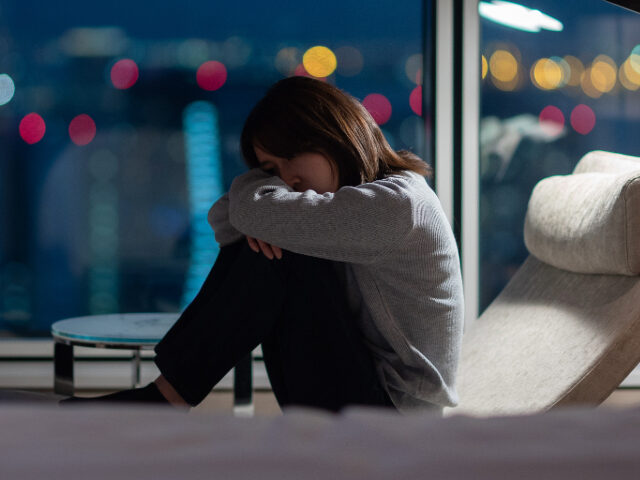Japan’s Act on Promotion of Policy for Loneliness and Isolation went into effect on Monday, one year after Parliament enacted it.
The law identifies loneliness as “an issue for society as a whole” and tasks the government at all levels with providing support for lonely and isolated people.
The loneliness law was passed at the beginning of April 2023 as a response to the growing sense of isolation among Japanese citizens after the lockdowns and social distancing measures of the Wuhan coronavirus pandemic.

People wear face masks as a preventive measure against the novel coronavirus in Tokyo, Japan, on April 15, 2023. (James Matsumoto/SOPA Images/LightRocket via Getty Images)
The effort to help lonely people will be spearheaded by a task force led by the prime minister, currently Kishida Fumio, and will include contributions from all of his cabinet members. Japan has an official “Minister of Loneliness,” a rotating position created in 2021, which Children and Families Minister Kato Ayuko currently holds.
State and local governments have also been directed to create support groups, provide outreach services to isolated persons, and create more opportunities for social interaction. Some early efforts include websites and telephone services where people can discuss their feelings of isolation.
Polls have shown an astounding 40 percent of adult Japanese people experience feelings of deep loneliness on a constant or chronic basis, with an especially heavy concentration among people in their twenties and thirties.
Asahi Shimbun on Tuesday interviewed people in their twenties who talked about their lives going permanently askew during the pandemic, as education shifted online and young people began spending all day in front of their computer screens.

Makiko Tanigawa/Getty Images
One man, who is now 23 years old, said he went from being a happy and hopeful university student in 2019 to becoming physically ill from loneliness and depression. He has since volunteered to help with support groups for others with similar issues, although he says he still feels occasionally sick and agoraphobic. A fairly common issue among younger Japanese people seems to be a lingering fear of leaving their homes after the pandemic lockdowns.
“When you suffer from depression at a young age, you have nowhere to go,” the young man said, putting his finger on the problem Japan hopes to solve with its loneliness law.
Waseda University professor Kikuchi Yoshimi identified two other social problems:
There are a wide range of problems related to loneliness and isolation, including economic deprivation and the resulting lonely deaths, and the 80-50 problem, where parents in their 80s live together with their shut-in children in their 50s and are socially isolated.
Japan’s growing problem with “lonely deaths” or kodokushi made international news in the summer of 2021, as a growing number of people died during the pandemic lockdowns and went undiscovered for months. A cottage industry of cleaners who specialized in respectfully disposing of the lonely dead quickly flourished.

In this picture taken on August 19, 2017, a worker for special cleaning, wearing a protective suit, takes pictures of a man’s apartment who died alone and was left decomposing for three weeks in Tokyo, Japan. (BEHROUZ MEHRI/AFP via Getty Images)
The “80-50 Problem” is a phenomenon created by younger Japanese people, known as hikikomori, who withdraw from society — sometimes after giving up on building a career or starting families of their own — and move back in with their parents. The result is a large cohort of people who are now well into middle age (the “50s”) who have lived with their now-venerable parents for years (the “80s”).
This arrangement is increasingly seen as an unhealthy lifestyle that increases the isolation of both the young people and their parents, turning the family into an isolated unit that has little interaction with the rest of society. The hikikomori tend to have stunted life and social skills, having lived their entire lives under their parents’ roof, which leads to bizarre situations like elderly parents getting stuffed in closets after they die because their middle-aged children have no idea how to make funeral arrangements.
Widespread loneliness feeds into Japan’s demographic crisis, as isolated people tend to avoid getting married or having children.
One theory holds that Japanese culture was especially vulnerable to the problem of young people feeling helpless and ashamed because they could not find work when the entry-level job market grew tighter. Having endured the intense pressures of the Japanese educational system, generations of hikikomori felt betrayed when they could not ride the smooth track to the career success their parents enjoyed. They moved back in with their parents, found electronic distractions from their loneliness, and abandoned all thoughts of beginning a family of their own.
“The rise in unmarried individuals and financial woes are believed to be driving loneliness among the working population. Better outreach support is needed,” Waseda University sociology professor Ishida Mitsunori said in 2023 when the loneliness law was passed.

COMMENTS
Please let us know if you're having issues with commenting.